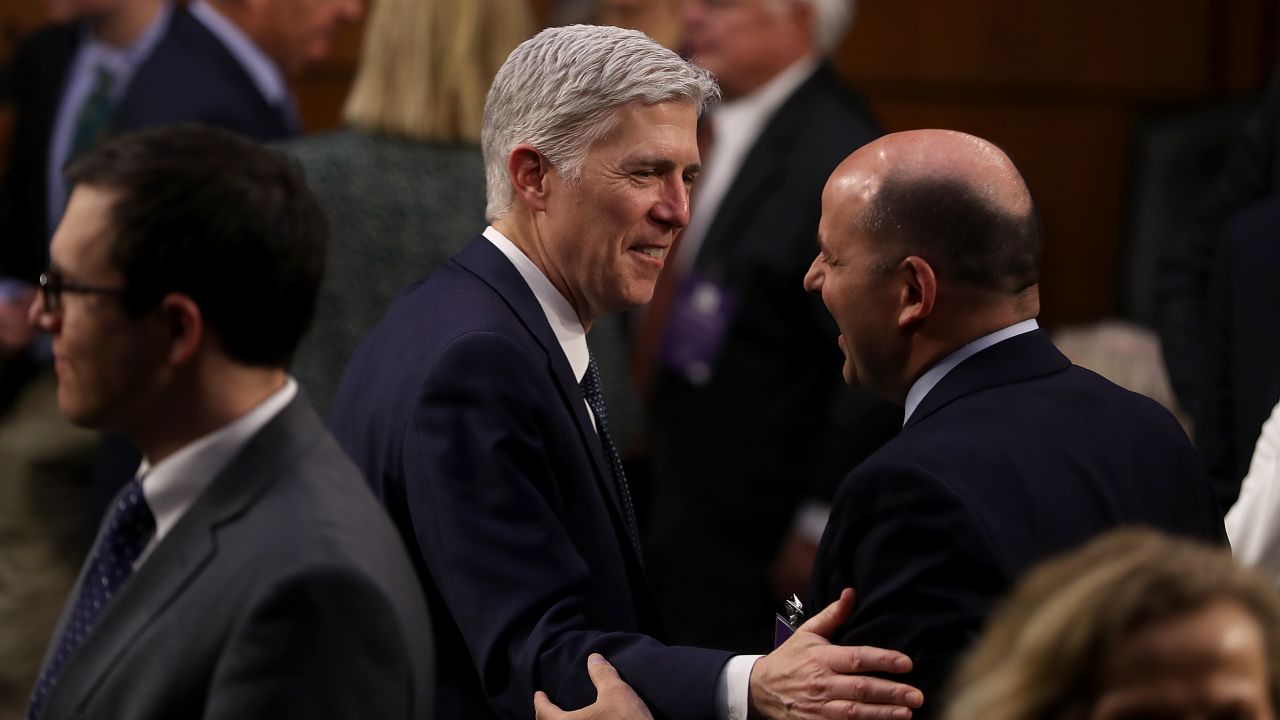
Judge Neil Gorsuch (left) greets an attendee during the third day of his Supreme Court confirmation hearing before the Senate Judiciary Committee in the Hart Senate Office Building, March 22, 2017 in Washington. (Photo by Justin Sullivan/Getty Images)
In Neil Gorsuch, the corporate class have their perfect manservant for the Supreme Court.
He looks the part: tall, handsome, greying (at 50), charming and erudite, every inch a gentleman.
His pedigree glistens: He went to the right schools, knew the right people, made the right moves, got the right coaching. He has an acute and knowing sense of theatrics; at his televised confirmation hearings, he appeared to know exactly when to turn to his wife seated behind him and pronounce his love as the cameras moved closer for their embrace.
This talent for carefully managed public intimacy may be little more than following the script and remembering your cues, and it may have spun many a discreet traditionalist justice in their graves, but his handlers must have winked at one another as they watched, now certain they had the right face and figure to mask the harsh inequity of the rulings the conservative majority on the Supreme Court will soon be handing down — if Gorsuch is approved — in the furtherance of corporate power and plutocratic privilege.
Gorsuch could not have come this far without the plutocrats. Like the late Antonin Scalia, he has a taste for their company; he’s a regular guest of right-wing plutocrat Philip F. Anschutz at his Eagles Nest Ranch in Colorado, where Anschutz invites the wealthy and politically prominent to mix and mingle at dove-hunting retreats. That little tidbit comes from a recent report by Charlie Savage and Julie Turkewitz in The New York Times, headlined: “Neil Gorsuch Has Web of Ties to Secretive Billionaire.”
As a lawyer for one of those Washington firms richly rewarded for helping to make the rich richer, Gorsuch ably served the interests of Anschutz (estimated worth: $12.6 billion from heritance, oil and gas, telecommunications, railroads, real estate, resorts, sports teams, stadiums and movies), so much so that Anschutz, who shovels money at Republican and conservative causes, decided his man should be a federal judge. He lobbied, the Bush White House listened and Anschutz got his wish: a seat on the federal bench for Neil Gorsuch.
Let’s stay on the money trail a little further. You may remember that when candidate Donald Trump released a list of potential Supreme Court nominees he would consider if he won the presidency, Gorsuch was on it. The list was compiled by two influential organizations from the most extreme wing of the conservative alliance — the Federalist Society and the Heritage Foundation. Both have received funding from Gorsuch’s patron, Anschutz.
If you have been watching cable news, you likely have seen a slick ad promoting Gorsuch’s nomination to the court. The sponsor is an outfit called the Judicial Crisis Network (JCN). Although his record prompts some court watchers to place Gorsuch to the right of Justice Samuel Alito Jr. and even, in one ranking, to the right of Clarence Thomas — really way out there — the ad makes Gorsuch sound as if he’s a moderate liberal; an effort, no doubt, to persuade some waffling Democrats to cross over and vote for his nomination.
And what exactly is the Judicial Crisis Network, the group behind the campaign to sell Gorsuch? According to an investigative report by Viveca Novak and Peter Stone, it’s a “secretive, right-wing judicial machine” with lots of money to spend; “dark money,” that is, from hard-to-trace sources.
Launched with the help of a former law clerk to Justice Thomas and a one-time Bush campaign operative, JCN proved crucial in drumming up support for Bush Supreme Court nominees Alito and John Roberts Jr. Last year it spent a reported $2 million on ads to block Barack Obama’s nominee to the Supreme Court, Merrick Garland, who didn’t even get a confirmation hearing. Now it’s spending even more to support Gorsuch’s confirmation. When senators pressed Gorsuch to reveal the undisclosed donors “as a matter of respect for the process… so we can evaluate who is behind this effort,” Gorsuch pirouetted away from an answer.
There’s more. Novak and Stone wrote that “to expand its influence in state elections, JCN has emerged as a pipeline for secret money to other, better-known dark money groups,” including the Republican Attorneys General Association and the Republican State Leadership Committee. In 2012, “it dished out more than $2 million in court races in Michigan alone — half of that in a single down-ticket state circuit contest.” In 2008 “it funneled $200,000 to a Wisconsin group that produced the negative attack ads that helped a conservative eke out a victory over a sitting [state] Supreme Court justice, tipping control of the bench to the right.” With another ally, it even spent $1 million trying to kick off the bench a Michigan county circuit court judge.
The Judicial Crisis Network is a linchpin in a nationwide effort by conservative and business groups spending millions of dollars to get Republicans elected as state attorneys general who would then bring cases that challenge the federal government’s power to protect citizens, consumers and the environment. Such a friendlier legal climate would especially be hospitable to curbing tort liability for corporations, making it even harder for citizens to hold big business accountable.
This is the “dark money juggernaut” now in overdrive to put Philip Anschutz’s man on the Supreme Court, just a portion of the deep-pocketed crowd behind Neil Gorsuch. These donors and activists have had his back. He is part and parcel of their world view. They now eagerly anticipate the big payoff.
So, Democrats have legitimate reasons to try to stop his confirmation this week. Their gambit — a filibuster — is risky. None of its consequences are likely to be happy. But they should not be cowed by an inability to read the future. Sooner or later in politics, you have to take a stand, even a costly stand, to discover if you really are who you think you are. You can’t go on being bought off, pushed around, made a fool of and outmaneuvered by unprincipled adversaries like Senate Republican Leader Mitch McConnell, who one year ago, backed by the likes of the Judicial Crisis Network and a host of secret donors, crudely and completely blocked Merrick Garland’s nomination to the Supreme Court.
One politically conservative lawyer, a former clerk to Justice Scalia, praised Garland as “someone with high intellect, a very decent fellow.” And then he added: “The only criticism I’d make of him is that he’s liberal.”
At least the man was honest; Mitch McConnell, not so much. Begging Democrats to give Judge Gorsuch due deference, he said: “I hope colleagues on both sides will show him the fair consideration he deserves — the same fair consideration we showed to all four of the Supreme Court nominees of Presidents Obama and Clinton after they were first elected — a respectful hearing followed by an up-or-down vote.”
Really! McConnell the hypocrite simply had Merrick Garland disappeared, to be replaced now by Neil Gorsuch, the protégé of a plutocrat.
Democrats have no choice. Sometimes in politics, if your opponent keeps swinging at you with brass knuckles, for the sake of honor — not to mention the sake of democracy — you have to reply with sharp elbows.




